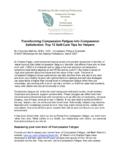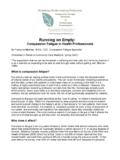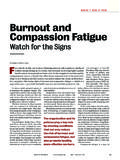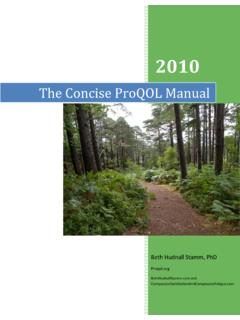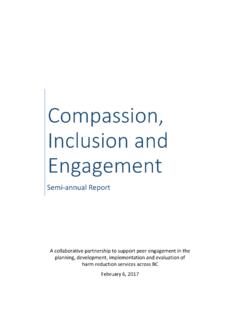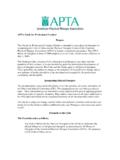Transcription of Compassion Fatigue: Emotional Burnout in the Animal Care …
1 Compassion fatigue : Emotional Burnout in the Animal Care Field September 2011 by Colleen Mehelich Founder, Web: Media Contact for : Dell Richards Publicity 916-455-4790 The "double-edged sword" phenomenon of working in the Animal care industry you ve dedicated your life to making a positive difference for animals, but the Emotional stress is draining, exhausting and taking a toll on you. You can t imagine doing anything else with your life, but outside of your work, do you have a life? You work in the Animal care industry, not necessarily because you ve chosen to, but because it s chosen you. You cannot exist without doing all that you can to care for and save animals. You love what you do, but the heartbreak and Emotional strain on you is sometimes too much to bear. There is a term for all of this, it s called Compassion fatigue (further referenced as CF) and it is normal, and very real.
2 Not only does CF dominate your professional life, but it always rears its head in your personal life sleepless nights, exhaustion, acute sadness, depression, isolation from friends, a life that feels out of balance, rides on Emotional rollercoasters, and anger towards people in general for the terrible ways in which they treat animals. According to Dr. Robert G. Roop, President of the Humane Society University and author of Compassion fatigue in the Animal -Care Community, CF is most prevalent in the Animal care field than in any other field. Why is this? He believes that it is the sheer volume of animals, of beings, that Animal care workers deal with on a daily basis. Unlike physicians for humans, or psychologists or counselors, people in the Animal care field, specifically in shelters and rescues, can be caring for up to 500 animals a day in some cases. The number of lives and suffering that one is exposed to is much higher than in human care fields.
3 This creates a burden on the heart and soul of the caregiver. Everyone responds differently to these stressors and everyone has different coping skills available to them. CF is not exclusive to those dealing with euthanasia and end-of-life situations though. Here are some interesting and very surprising facts about Compassion Fatique: 1) Females have only slightly higher CF scores 2) CF has nothing to do with the number of years you ve been working in the Animal care field 3) CF has no correlation to age 4) CF is only minimally related to euthanasia. Anyone in the Animal care community can "get" CF, and Dr. Roop specifically uses the word "get" as a reminder that no one is born with CF. It is something that develops, and it can develop in anyone who is involved in a care giving relationship. CF is the "cost of caring for others in Emotional pain". The concept and study of CF developed out of the field of traumatology and falls under the category of Secondary Traumatic Stress Disorder (STSD).
4 We ve all heard the term Post-Traumatic Stress Disorder (PTSD), especially with the number of returning soldiers from the Middle East. With PTSD the symptoms are directly connected to the person who is suffering and experiencing the traumatic stress firsthand. The symptoms of STSD are pretty much identical to PTSD with the difference being that the "exposure to knowledge about a traumatizing event is experienced by a significant other." PTSD is about the absorption of someone else s pain and suffering. You are like a full sponge that cannot absorb any more pain and suffering. What would you say the ratio of happy experiences is to sad experiences are in this field of work? Even if you re more heavily weighted towards happier experiences, according to Stephen P. Robbins, author of Organizational Behavior, "people reflect and think about events inducing negative emotions 5 times as long as they do about events inducing strong positive emotions.
5 " It is simply human nature. We replay negative and traumatizing events over and over in our minds. There is a debilitating and negative effect on our emotions and our stress levels when we re-experience the trauma in these replays in our minds. So how do you balance the happy ( Compassion Satisfaction) and the sad ( Compassion fatigue )? The happy is the satisfaction and fulfillment that you get through working with animals, the reason why you got into the industry in the first place, right? But it comes with so much sadness, pain and often frustration. You need to start to pay closer attention to, and take better care of your own needs so that you can make more room in your life for the Compassion Satisfaction. As someone dedicated to a field where you re caring for others in need, you naturally put the animals well being before your own. But as we all intuitively know, we don t have much to give if we don t keep the love and generosity that we have inside nurtured, enriched and replenished.
6 In devoting ourselves to others, we can easily lose ourselves. CF is what we experience when we are out of balance from caring for others more than we care for ourselves. Here are some pointers to start to bring your caring and giving nature back to focus on yourself. You are a hero doing some of the most difficult and most important work for animals. Honor yourself and feel proud of the difference you are making. Know and recognize that you are an active part of the solution. Take a look at "why" you re so dedicated to helping animals. Be sure that you re not putting the animals welfare before your own. You need to take care of yourself first. If you don t take care of yourself, you ll have nothing left to give to the animals. Practice creating Emotional boundaries. You need to protect yourself from the toxins of others Emotional pain. When you take on others problems and pain as your own, you are much less able to help them with their pain and suffering, the very thing that originally set out to do.
7 Carve out the time in your life to relax and play. They may sound undoable, but it s imperative to your well being. Do you have any hobbies? Cultivate activities and interests outside of your work, which have nothing to do with your work. You need to recharge your batteries and rejuvenate your soul We all have our own issues. Work on identifying yours and you ll find your Emotional attachment to your work begin to ease. Many of us are drawn to the Animal care field out of our love for the animals, but also because we have also suffered abuse, abandonment or neglect in our own lives. It s important to face our own pain and to be careful of not becoming addicted to helping heal others instead of ourselves. It s okay to seek professional counseling if you needed. You can handle strong emotions. You don t need to avoid them, you need to process them. Sorrow, anguish, anger, rage, and guilt are going to be ever present in your work.
8 It should be a relief to know that you can feel these feelings and they will be released they will not overtake or destroy you. If you deny them they will fester and lead you to Burnout . Accept both your reality and your own limitations. As much as you d love to, you can t save every Animal . We can each make a difference one Animal at a time, and you re most probably doing an amazing job at that every day. Find out more information about Compassion fatigue or to join The Compassion fatigue Awareness Project Forum, visit Here, you can collaborate with other Project associates and stay connected to the CFAP community. If you think you may be a Compassion fatigue sufferer, you can visit the Professional Quality of Life - Compassion Satisfaction, Compassion fatigue and Secondary Traumatic Stress website and take the Compassion fatigue Self-Test and be on your way to awareness and help for a better tomorrow.
9 Patricia Smith, founder of the Compassion fatigue Awareness Project, published To Weep for a Stranger: Compassion fatigue in Caregiving. Along with in-depth explanations of Compassion fatigue and its symptoms and causes, the paperback features comprehensive chapters on topics such as The Burdens of the Chosen, When Caring Too Much Hurts, The Decision to Heal, and Standards of Self-Care. Patricia Smith is a certified Compassion fatigue Specialist with 20 years of training experience. As founder of the Compassion fatigue Awareness Project ( ), the outreach division of Healthy Caregiving, LLC, she writes, speaks and facilities workshops nationwide in service of those who care for others. She has authored several books including To Weep for a Stranger: Compassion fatigue in Caregiving, which is available at or

